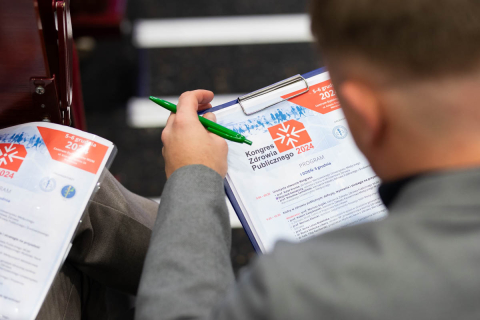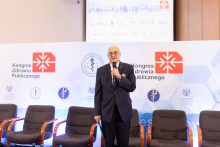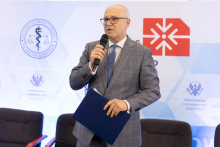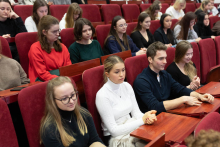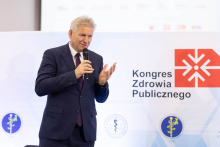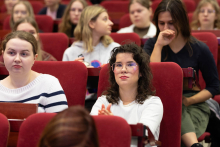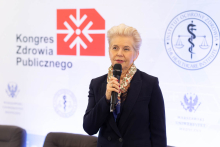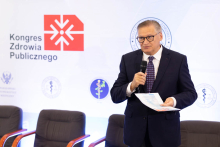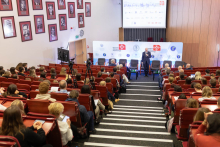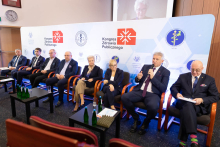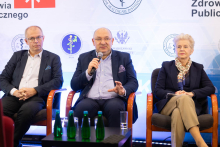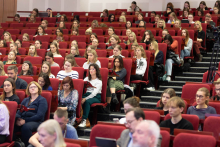The event was held on December 5-6 at the Didactic Center MUW. Traditionally, the congress was organized by the Department of Public and Environmental Health of the Faculty of Health Sciences MUW and the Institute of Health Care. The guests were welcomed by Prof. Mariusz Gujski, Dean of the Faculty of Health Sciences.
- Public health is a very broad, interdisciplinary field. And the beauty of it is that it brings together all people who are interested in improving the health of the population, but also each individual participant in that population - noted Prof. Mariusz Gujski.
Opening ceremony of the congress
Rector of MUW, Prof. Rafal Krenke, congratulated the organizers on the rich program of the event, as well as for bringing together prominent experts as speakers.
- I wish you very fruitful deliberations, maybe even stormy at times - said Prof. Rafal Krenke at the end - And I wish that this is not just an exchange of certain information, but that a certain wisdom is forged together here. Wisdom that we then take to higher stages and manage public health in our country in an appropriate way.
Congratulations were also offered by Wojciech Konieczny, Secretary of State at the Ministry of Health, who stressed that in the context of the challenges facing Poland, including the Polish presidency of the Council of the European Union, the voice of public health experts is very important and necessary.
- I am glad that you are deliberating today, that we will be able to use your knowledge and your conclusions - said Wojciech Konieczny - Undoubtedly, the help of specialists, experts, people who do not have to open doors that have already been opened is essential.
Senator Beata Małecka-Libera, Chairwoman of the Health Committee, also spoke: - It's been 10 years since the legislation, and we still have a lot to do in public health. The fact that every year we meet at congresses and every year we talk about the role of health education and prevention is slowly beginning to bear fruit. Because even clinicians are already talking more and more about starting with prevention. And I think this is our collective success, albeit it took quite a few years.
Finally, Professor Bolesław Samoliński, Head of the Department of Public and Environmental Health MUW, briefly presented the most important issues of the congress. He stressed that the quintessence of the event is to work together for the benefit of health and to introduce such changes in the system that will allow to extend the life expectancy of the Polish population, and at the same time make old age a joyful and active stage of life.
The event's program consisted of nine panel discussions. In addition, a scientific session was held, during which scientists, students and doctoral students presented the results of their work and research in the field of public health.
Panel on human resources in public health
Interviewees, including a representative from government departments, wondered why public health specialists, despite their knowledge and competence, often hold professional positions outside the health care system.
The interdisciplinary nature of public health education and the very diverse preparation to support the health care system was pointed out by Filip Raciborski, MD, PhD, Vice Dean for Public Health at the Faculty of Health Sciences MUW.
- On the one hand, we have to work with students, making them aware of the different career paths - the vice dean pointed out - and on the other hand, work with employers to show what the profile of these students is and what the benefits of hiring them can be. Because these people are very comprehensively educated, which is a super solution in a changing world, because today these competencies are needed, and tomorrow others. And our graduates meet these criteria.
The debate also discussed public health challenges in the context of demographic changes and the ever-increasing number of patients with diseases of civilization.
- Today, medicine has made such tremendous progress that we are able to deal with many disease entities, while the question is where to get the money for this - pointed out Prof. Robert Gałązkowski, Vice Dean for Emergency Medicine at the Faculty of Health Sciences MUW, Head of the Department of Emergency Medicine.
Panel on innovation and future technologies in healthcare
In the debate, Magdalena Januszewicz, MD, PhD, Head of the 2nd Department of Clinical Radiology MUW, talked about the tremendous progress that has been made in recent years in radiology, making it not only a diagnostic specialty, but also a surgical one.
- What used to be vascular diagnostics: i.e. catheterization of vessels, taking pictures after administration of contrast agent at the moment we are expanding to include vasodilation, unblocking, removal of embolism, insertion of stents, insertion of filters - enumerated Magdalena Januszewicz, MD, PhD - We have the possibility to close aneurysms either by filling them with spirals or covering them with various types of stents, both in the periphery and in the central nervous system. At the moment, the vast majority, more than 80%, of intracranial aneurysms are operated on endovascularly, and this is done by interventional neuroradiologists.
During the discussion, the topic of artificial intelligence and its use in medicine was not absent. Prof. Mariusz Kuśmierczyk stressed that in his field - cardiac surgery - artificial intelligence is not a new development. It could certainly support doctors on the organizational side, but he does not think it could replace them at the operating tables. On the one hand, this is due to the lack of legislative solutions, and on the other, to the variety of possible complications.
- Not all complications are the same, and in cardiac surgery we have some that we would never have thought could happen - said Prof. Mariusz Kuśmierczyk.
Panel on fighting misinformation in health and climate
In the last panel of the congress, experts discussed disinformation - where the phenomenon originated, what it is and how much harm it causes. The introduction to the debate was a short lecture by Camille Huser, Vice President of the European Network on Climate and Health Education (ENCHE). The speaker cited a publication from the prestigious BMJ journal, in which experts predict that climate and health will be major areas of misinformation, and that health professionals and students are key in countering it. She added that health professionals, students and the general population, among others, lack awareness of how climate change is affecting health now and in the future. Therefore, education in this regard is very important.
The lecture was followed by a discussion. Among the interlocutors was Wojciech Feleszko, MD, PhD, from the Department of Pediatric Respiratory Diseases and Allergology MUW, who noted that doctors, as representatives of a profession that enjoys high public trust, can play a significant role in the fight against misinformation.
- I see a certain role of scientific or medical authorities as decisive. Look at what happened during the pandemic. Television screens stopped hosting celebrities, and epidemiologists, public health specialists, virologists, immunologists appeared, that is, at a certain point in the crisis, the media turned to reliable scientific authorities and they were taken as a reference point. The fake news message retreated somewhere - said Wojciech Feleszko, MD, PhD.
In his view, in preventing false information, proper education from early school years about how to search for information and how to verify it is crucial.
In turn, Dr. Aneta Tomaszewska from the Department of Prevention of Environmental Hazard, Allergology and Immunology MUW, who was involved in the implementation of a major project entitled “Building confidence in immunization using the latest communication and social influence tools,” pointed out, among other things, who is susceptible to misinformation.
- Disinformation in medicine, and in vaccination in particular, can be compared to an infection. To an infection that is dangerous in itself, the pathogen is dangerous, but the course of the disease will be as dangerous as it hits susceptible ground.
If fake news reach people who have constructed views and a solid knowledge base, the impact of disinformation will be limited or nonexistent. Disinformation, on the other hand, is susceptible to people who have no knowledge or unformed views on a given topic. Under the influence of fake news, they begin to doubt and allow that they may have a grain of truth in them. As Dr. Tomaszewska added, this was clearly seen in a project conducted by the Department on confidence in immunization. As many as 60% of the more than 1,500 people surveyed between the ages of 15 and 39 were those with ambiguous views.
-Some of them are people who are not yet affected by the problem: they are young, they don't have children, they haven't faced the subject of vaccination - whether it's worth it or not, they know something about diseases, but only generally - explained Dr. Tomaszewska - But the other part of this group of people are already older people, who most often have children, in whom this attitude is positive in the sense that they see that the threat is there, that this threat can be leveled by vaccination, but the second element that appears in these attitudes is a great concern about the safety of vaccinating children. That is, such a natural thing, because every parent has the right to be concerned about the health of their child. And in the context of various medical procedures, this child is the most important thing for him. And we won't get to him with a statistical message. These ambiguous attitudes are a field for manipulation. Because if this medical fake news, this misinformation about vaccination touches these emotional areas, refers to what is closest to us, and still exposes negative cases, then those people who even have positive attitudes towards vaccination in general, they begin to hesitate.
Other congress topics and discussants
The congress also discussed how effective health education and preventive measures can reduce the development of diseases of civilization, equality in the care of patients with rare diseases, new horizons in hematooncology and oncology, electronic medical data systems and artificial intelligence, psychiatry and barriers to accessing psychiatric care, as well as the challenges of an aging society.
Other participants in the discussions included: Prof. Mariusz Klencki, Director of the Department of Medical Personnel Development at the Ministry of Health, Mateusz Oczkowski, Deputy Director of the Department of Drug Policy and Pharmacy at the Ministry of Health, Maciej Karaszewski, Director of the Treatment Department at the Ministry of Health, Mariola Łodzińska, President of the Supreme Council of Nurses and Midwives, Dr. Andrzej Titula, Vice President of the Supreme Council of Nurses and Midwives, Marek Tomków, President of the Supreme Pharmaceutical Council, Marek Augystyn, Vice President of the National Health Fund, national consultants: Prof. Anna Latos-Bieleńska, Prof. Brygida Kwiatkowska, Prof. Karina Jahnz-Różyk, Prof. Ewa Lech-Marańda, Prof. Piotr Gałecki, Prof. Tomasz Targowski, Senator Dr. Agnieszka Gorgoń-Komor, MPs Wioleta Tomczak and Bartłomiej Pejo, representatives of public institutions, companies, universities, foundations.
From MUW, in addition to those mentioned above, the congress was attended by: Prof. Artur Mamcarz, Head of the 3rd Department of Internal Diseases and Cardiology, Prof. Agata Szulc, Head of the Psychiatric Clinic, Prof. Marcin Wojnar, Head of the Department of Psychiatry, Prof. Anna Kostera-Pruszczyk, Head of the Department of Neurology, Paweł Łęgosz, MD, PhD, of the Department of Orthopedics and Traumatology of the Locomotion System, Dr. Paulina Mularczyk-Tomczewska of the Department of Public Health.
The entire list of speakers and the event program are available on the congress website.
